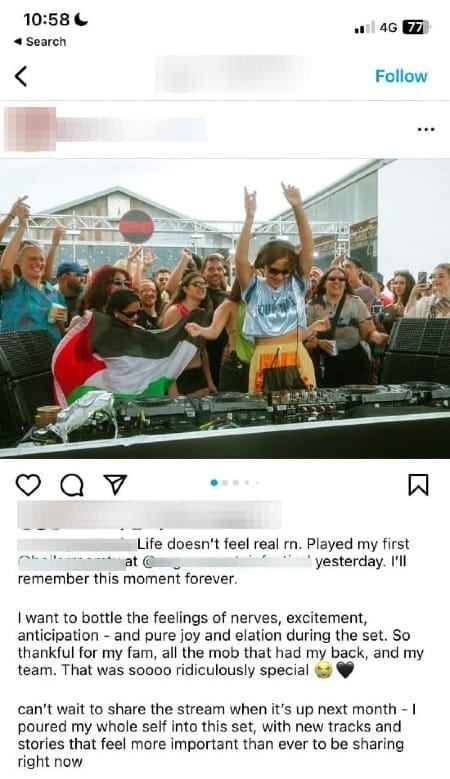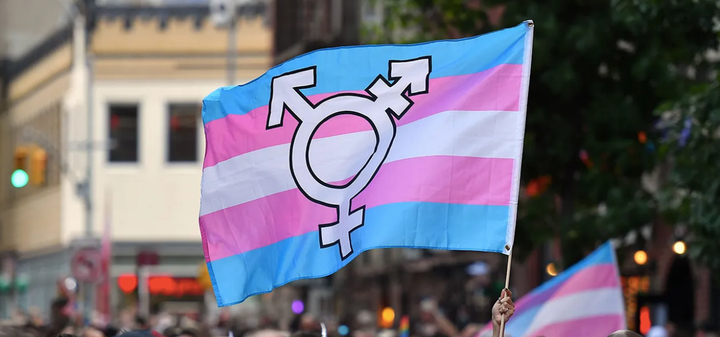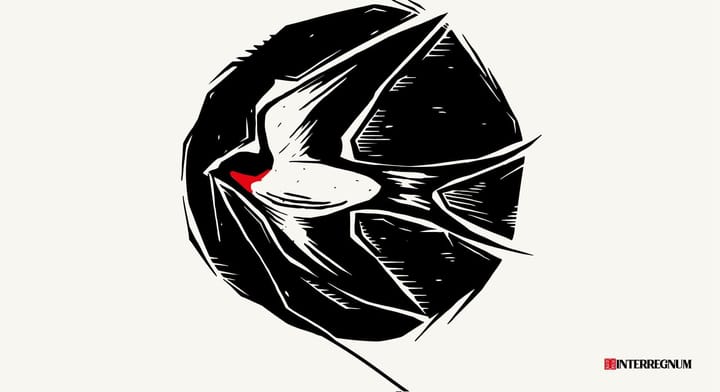As we witness the unfolding genocide in Gaza, solidarity is essential. However, solidarity is a process, not a singular act. It involves both cultural and political forms of struggle. Above all, it requires confronting the overarching sense of impotence in the face of horror.
by Panos Theodoropoulos
This article is not intended to function as a sort of measuring stick on who is organising the 'best' solidarity actions. Rather, it is an attempt to work through some of the most contradictory, and perverse, aspects of the current historical moment.
Content warning: discussions of the genocide in Gaza.
Sometime in November, I performed in a solidarity gig for Gaza. As someone that supports the Palestinian resistance above and beyond any musical endeavours, I jumped at the chance to support the event, especially in the context of an unfolding genocide. I have played in various solidarity initiatives in the past: in fundraisers, in festivals for political groups, and in efforts to reclaim public space. However, there was something different about this specific gig, and it highlighted a range of issues that, I believe, we must speak openly about.
As I was on the stage, performing my songs and looking upon the drunk, high, and happy eyes of the audience – who were dancing, spilling drinks, laughing, and generally partying – I could not stifle a nauseating, eerie sense of complicity in the genocide. Paradoxically, it felt as if we were celebrating it. By my presence there, I was promoting myself; throughout the event, the audience were enjoying themselves. We were all having a good time. How perverse is it to be having a good time in an event that aims to challenge an unfolding genocide?
Yet the content of my set was one of the most overtly political ones in this gig; other acts were purely centered on entertainment. As I stood in the audience later amidst the throbbing crowd, I was wondering something that should have been obvious: who are we doing this for? What are we doing this for? Does this really contribute to the struggle that the Palestinians are waging? And, if it does, should it really be necessary to create 'fun times' in order to coax people into supporting Palestine?
I imagined the scene: a Palestinian friend of mine was being bombed, his child mutilated, one of the thousands of kids murdered by Israel. And me, sending over a video of the gig, lights flashing, people dancing and vomiting in the corners: this is our action of solidarity with you.

As already mentioned, this is not intended to be harsh negative criticism. Rather, this is an opportunity for self-criticism, self-questioning, and self-reflection. I am trying to explore how we, as people in the West almost entirely removed from the bombs falling on Gaza, can act in solidarity without lapsing into a self-aggrandising emptiness that functions to release our frustration/exasperation/desperation without actually challenging anything. Beyond this, I think that we must find ways to work through the overarching sense of impotence that insidiously lies behind almost every radical mobilisation.
Solidarity is a process, not a singular act. And it involves both cultural and political forms of struggle, simultaneously.
The spectacle's engulfment of resistance
In a collection of essays titled The Agony of Power written shortly before his death, Jean Baudrillard touched upon the seeming futility of almost all forms of resistance against the status quo. Simply put, we are now living in an age where almost all manifestations of resistance can be recuperated by what Guy Debord called the 'spectacle': the various forms of cultural production and occurrences (theatre, movies, books, posters, and even demonstrations) that all work together in creating our perception of ourselves as humans, and actors, in this society. The spectacle also defines the limits of what is considered possible. Rather than challenging us to overcome our difficulties, most of the stimuli around us nurture a passive resignation; instead of actors, we become consumers.
The spectacle covers almost everything: a revolutionary sign, like the symbol of anarchy or the face of Che Guevara, is now mostly an aesthetic choice, entirely removed from its revolutionary history. A radical book is sold in bookstores next to others that have absolutely no relation to any transformative politics: it simply caters to a different cohort of consumers, equalising resistance with all other forms of individualist consumption choices. A cafe uses its 'ethical' label to attract specific customers; yes, it might engage in less exploitative labour and/or sourcing practices than many other establishments, but it still functions to legitimise the capitalist system, a system that prides itself on offering choices for every different taste. The desire to improve the world once again is reduced to an issue of personal preference. Even a protest can be engulfed by the spectacle, functioning as a release valve for popular frustrations and allowing capitalism to claim that it is indeed a system premised on freedom, since it permits dissent. At the end of the protest, we go home, watch Netflix, and continue our existence as if nothing has changed.
Without a direct connection with concrete, tangible processes that contribute to directly challenging Israel's power, initiatives such as solidarity gigs are liable to serve nothing more than pacifying us. And, in doing so, our overarching sense of powerlessness becomes stronger, because we experience that we cannot do anything but have solidarity gigs. Exhausted, pacified, and powerless, our spiral continues.
From impotence to solidarity
The enormity of the destruction in Gaza is incomprehensible to anyone who is not directly experiencing it. In the face of this enormity, our impotence is laid bare: rather than analysing and confronting it, we are frequently reduced to a performance of solidarity, a ghost of activity. Instead of focusing on how we can best use our resources to resist the genocide, we may inadvertently become more focused on resisting our own sense of impotence, hiding behind disconnected activities in a desperate, frantic release of energy.
We experience this impotence whether or not we are conscious of it. It is reproduced far beyond the realm of a single protest or a single solidarity gig. Even international organisations such as the United Nations are apparently incapable of influencing anything, and the recent International Court of Justice (ICJ) case confirmed that formal institutions can do little more than politely beg Israel to 'avoid' genocide. International popular movements are the only forces that could potentially have an impact. Recent protests against the genocide have undoubtedly constituted the most significant wave of popular mobilisation in recent years, with millions around the world consistently attending demonstrations for over three months. Yet the genocide continues, and national governments in the West continue supporting it.
In this context of impotence, initiatives such as solidarity gigs can function in two ways. They can either act as a release valve, allowing us to feel good about ourselves (after all, we did something) while hoping for the impossible, or they can contribute towards a coherent programme, a method of resistance, that aims to have tangible outcomes. The issue therefore becomes one of moving from impotence to practical solidarity.
However, one might say that solidarity gigs and fundraisers, by themselves, are far from simply performative; they raise money for organisations that provide vital support on the ground, especially at a time when these groups desperately need it. This is true; but in isolation, their effect is like using a band-aid to heal a severed head. Israel has one of the strongest militaries in the world, and it is a widely accepted secret that it possesses nuclear weapons. For 2022, it received more than $3.3 billion in aid from the United States, and all of it was military. This money is converted into weapons that murder Palestinians. This is not a battle that can be won through our economic efforts alone.
Every solidarity gig, every fundraiser, every protest, every public speaking endeavour is important; however, it should extend beyond the confines of the specific initiative. The international movement against Apartheid in South Africa should be used as a guiding example. International pressure can work, and it can be much more powerful than simply making us feel good about ourselves. However, it needs to be oriented towards very tangible, specific aims: an immediate humanitarian ceasefire, and an immediate end to the occupation.
This pressure can take the form of initiatives that directly disrupt Israel's capacities to murder Palestinians, such as occupying or blockading businesses that are involved in the genocide. This includes supporting the Boycott, Divestment and Sanctions (BDS) movement, thereby incapacitating Israel's economy. Ultimately, the strongest action that we can organise in the West is to build towards a sustained mass strike, completely debilitating our own economies and forcing our governments to act. Of course, this involves a sustained battle within our own unions. For those of us not in unions, it involves joining them, or participating in other forms of direct resistance. Everything is connected.
It is important to remember why we are doing whatever we do: we are witnessing a genocide, and that word is not being used hyperbolically. Simply put, attending a fundraiser and donating a sum towards some human relief effort is important; however, it is almost cancelled out if at the same time you financially support a whole range of businesses that directly contribute to Israel's capacity to kill Palestinians. It is also completely pointless if your action stops after attending one event. These events – the protests, the gigs, the speeches – are the beginning of the process of solidarity, not the end. Without this critical connection, all efforts are wasted, and the sense of impotence becomes a reality.
The battle of words
Beyond building towards a concrete solidarity process of disruption, BDS, and mass strikes, it is critical to work towards dismantling the narratives that Zionism uses to justify blatant collective punishment against Palestinians in the form of genocide. This is a cultural struggle, and is just as important as the political one.
As Gabor Maté and other Holocaust survivors have repeatedly argued, the genocide currently unfolding in Palestine currently has nothing to do with Israel's attempts to defend itself. While antisemites the world over have jumped at the opportunity to demonise the Jewish people as a whole (and this must be resisted unequivocally), there is nothing antisemitic about criticising the actions of the Israeli state, especially when it concerns war crimes such as the mass executions of civilians, the death of children, the direct bombing of medical facilities, and the creation of a humanitarian catastrophe. Indeed, the actions of the state of Israel are being openly opposed from within the Jewish community. The charge of 'antisemitism' on any attempt to criticise Israel is not a new phenomenon, but it is currently being carried to its most extreme conclusion. Resisting this charge is something that everyone can contribute to: in the family, at school, at work, and in public. And it is a critical aspect of the work that is necessary in order to get people to the streets, to support BDS, and to strike.
Beyond this, it is also imperative to completely dismantle the dominant narrative of 'terrorism'. Ever since 9/11 and the illegal wars in Afghanistan and Iraq, the international movement has been arguing that 'terrorism' is a word used by the powerful to justify imperialist assaults against the rest of the world. Under the umbrella of resisting 'terror', Western governments terrorise entire nations; and today, Israel is using the word 'terrorism' to justify genocide.
Finally, a note on resistance. Israel is engaged in apartheid; this is not a claim made by Hamas, but by Michael Lynk, the UN's Special Rapporteur for Human Rights in Palestine. In these conditions of blatantly disproportional force, the charge of 'terrorism' by Palestinians is a ridiculous accusation. As people in the West, we do not choose how the Palestinian people will resist. Arguing about 'legitimate' and 'illegitimate' forms of resistance when one side of the equation has been suppressed for decades, not even having autonomous access to water and healthcare, is a false argument. Instead of losing ourselves on whether we 'condemn Hamas' as a qualifying statement for arguing against genocide, our overarching and non-negotiable demand must be an end to the occupation of Palestinian territories, as a condition for any future negotiation to be able to proceed on relatively more equal terms. In this context, one of the most important actions we can take is to amplify Palestinian voices.
The takeaway
There is no blueprint for opposing genocide. While human history has seen instances of successful revolutions, we have never been successful in preventing a genocide. The nightmare currently unfolding in Palestine will leave a gaping wound on our collective consciousness forever.
Given the overwhelming weight of the historical moment, lapsing into impotence is extremely easy. Similarly to how a deer is paralysed in front of headlights, inaction is an almost natural response to facing impossible odds. To further complicate things, action alone is not an antidote to impotence: as explained above, action in itself is not necessarily transformative. It can be used simply to give us the illusion that we are doing something. Like shivering in the middle of a snowstorm, the realisation of futility despite our having acted is liable to further entrench our sense of impotence.
The only solution to this impotence is structure. We must understand that, rather than being a performative reaction, solidarity is a process. Our solidarity efforts must coalesce towards building a powerful movement of resistance, BDS, and strikes. At the same time, we must dismantle any false narratives that are used to justify the current Israeli aggression and its occupation of Palestinian lands. These two aspects are inseparable and synchronous. Absent this movement, our actions amount to nothing more than a dance upon the graves of Gaza.
Panos Theodoropoulos is a political sociologist and a member of the Interregnum collective. He is currently writing a book on migrant labour in the UK, to be published through Polity Press.






Comments ()